How Schools Are Helping Online Students Achieve Goals
13 min read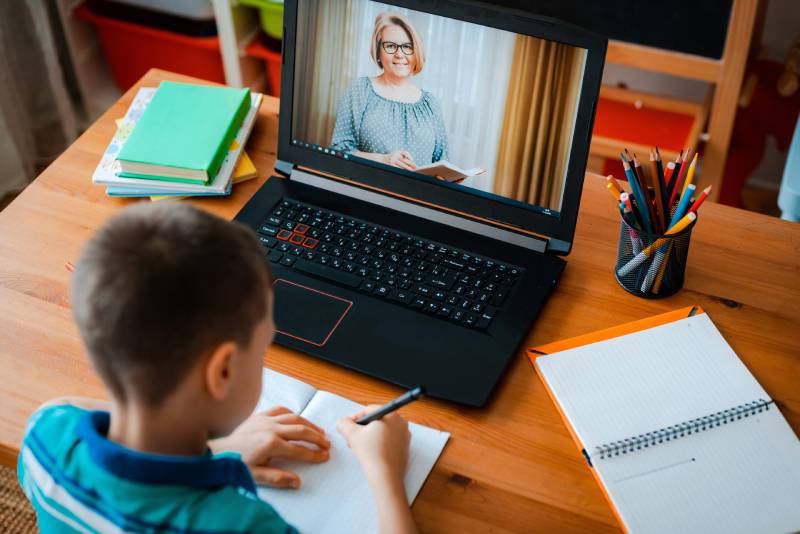
Covid-19 has changed the way we live. This pandemic has opened and closed many things for people all over the world.
Speaking of academics, nowadays, it’s common to do online classes instead of the traditional way, considering that the risk of contracting the virus is higher when you interact with more people in various ways. Schools have been adamant about opening up their doors before a massive vaccination.
Dubbed the new normal, online schooling has enabled students and teachers to accomplish education-related activities without seeing one another in person. There are now a lot of online partners for academic success, guiding students in their schoolwork. But, the most critical aspect is how schools help their online students achieve their goals considering the current state.
There are many ways that schools are helping online students achieve their goals, including:

Providing high-quality online course materials and resources: Schools are investing in online course materials and resources to ensure that online students have access to the same quality education as on-campus students.
Offering flexible scheduling options: Many schools offer online courses that allow students to complete coursework at their own pace, which can be helpful for students with busy schedules or other responsibilities.
Providing access to academic advisors and other support services: Schools are working to ensure that online students have access to the same support services as on-campus students, including academic advising, tutoring, and library resources.
Offering virtual office hours and other opportunities for interaction with instructors: Online students have the opportunity to interact with their instructors through virtual office hours and other forms of communication, such as email and online discussion forums.
Providing opportunities for student engagement: Schools are working to create opportunities for online students to engage with each other and with their instructors, through online discussion forums, virtual study groups, and other forms of interaction.
Table of Contents
Balancing work responsibilities
It can be a challenging task, especially if you have a lot of competing demands on your time.
Here are some tips that may help you to balance your work responsibilities more effectively:
- Make a to-do list: Write down all the tasks you need to complete, and prioritize them in order of importance. This can help you to focus on the most important tasks first and avoid feeling overwhelmed.
- Set boundaries: It’s important to establish clear boundaries between your work and personal life. Decide on specific times when you will not be available to work, and stick to them.
- Take breaks: It’s important to take breaks and rest in order to stay focused and productive. Make sure to take regular breaks throughout the day to rest and recharge.
- Seek support: If you’re struggling to balance your work responsibilities, don’t be afraid to ask for help. Talk to your supervisor or colleagues, or consider seeking the assistance of a professional coach or counselor.
Overall, schools are making significant efforts to ensure that online students have the support and resources they need to succeed in their studies.
There are several ways that schools can help online students improve their communication skills:
- Providing dedicated communication courses: Some schools offer dedicated courses that focus on improving communication skills, such as public speaking, written communication, and collaboration.
- Encouraging participation in online discussion forums: Online discussion forums provide students with an opportunity to practice communication skills by expressing their thoughts and ideas in writing, and by responding to the ideas of their peers.
- Offering virtual office hours or tutoring sessions: These sessions provide students with an opportunity to ask questions and get feedback from instructors or tutors in real time, which can help to improve their communication skills.
Here are some ways schools are helping online students achieve their goals:

1. Creating Space for Creative Works
Due to the lack of a traditional instructional process, schools have offered classes that incorporate creativity in acquiring education. Most schools work toward unleashing students’ talents like storytelling, reporting, video-making, and other activities.
While some students may find it hard to display their capabilities without in-person interactions, they discover other skills through online education. Online schooling also involves determining solutions by themselves without the usual readily available teachers to guide them. In this way, the school devises ways to include problem-solving activities in the regular classroom set up as a space for creativity.
There are many ways that you can create space for creative work, including:
Set aside dedicated time for creative work: It can be helpful to schedule dedicated time for creative work, whether it is a few hours a week or a block of time each day. This can help to ensure that you have the time and focus you need to be creative.
Find a suitable space: Consider finding a dedicated space for your creative work, whether it is a dedicated room or a quiet corner of your home. Make sure the space is well-lit, comfortable, and free of distractions.
Organize your space: Keep your creative space organized and clutter-free. This can help to create a sense of calm and can make it easier to focus on your work. It can professionally help in academic writing.
Take breaks: It is important to take breaks from your creative work to give your mind a chance to rest and recharge.
Find inspiration: Look for sources of inspiration, such as art exhibits, music, or nature, to help spark your creativity.
Be flexible: Be open to trying new things and exploring new ideas. Don’t be afraid to experiment and try new approaches to your creative work.
By following these tips, you can create a space that is conducive to creative work and that helps you to nurture your creativity.
2. Offering Flexible Hours

Schools have been closed for almost a year now, with more than a billion students affected. While most schools operate the whole day, they cannot do the same in online schooling. It also poses a lot of stress and anxiety to students, teachers, and parents alike to be always online every day. Schools offer flexible hours by uploading instructional videos that students can consult like in a classroom setup.
Understanding that the situation is vastly different from the pre-pandemic period, this is also a chance to revamp some outdated academic practices like whole-day schooling, giving more time to create and develop things on their own rather than caging students in the lecture room. The offers of flexible hours also help students adjust to their environment. offering flexible hours can be beneficial for students as well. Many students have a lot of competing demands on their time, including coursework, part-time jobs, and other commitments. Flexible hours can help students to better manage their time and to balance their academic and personal responsibilities.
For example, if a student is able to work part-time or on a flexible schedule, they may be able to better manage their course load and other commitments. This can help to reduce stress and improve academic performance.
In addition, flexible hours can also help students to adjust to their new environment. For example, if a student is new to a college or university, they may need time to adjust to their new surroundings and to make new friends. Flexible hours can allow students to have the time and flexibility they need to settle into their new environment and build a support network.
Overall, offering flexible hours can be a great way to support students and help them succeed in their studies.
3. Engaging Students in At-home Physical Activities
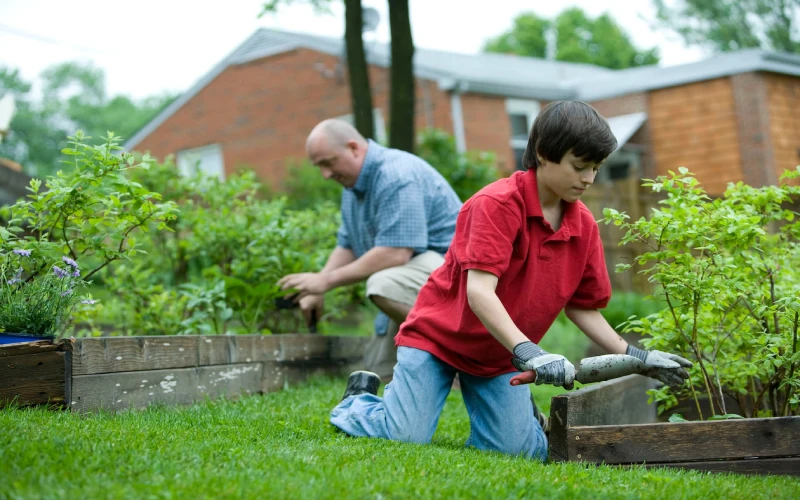
Physical activities are essential more than ever, knowing that there’s a virus spreading and that we need to boost our immune systems to protect ourselves. However, due to the online classes’ nature, most of the students sit down with their eyes glued to their screens more than ever, something that our gym teachers are worried about.
Engaging students to do physical activities while at home is one of the most critical roles the school plays. These activities are not done for the sake of doing it, but also for stimulating the mind to help students in academic success while combatting stress and anxiety.
There are many ways that educators and parents can encourage students to engage in at-home physical activities, including:
- Providing a variety of options: Offer a variety of physical activities that students can choose from, such as yoga, dancing, hiking, or sports. This can help to keep things interesting and can allow students to find activities that they enjoy.
- Making it fun: Find ways to make physical activity fun, such as by playing games or by setting up challenges for students to complete.
- Encouraging teamwork: Encourage students to work together and to support each other during physical activities. This can help to create a sense of community and can make physical activity more enjoyable.
- Setting goals: Help students set physical activity goals, such as completing a certain number of laps or minutes of activity each day or week. This can help to motivate students and can help them to see their progress over time.
- Providing support and encouragement: Encourage students to be active and to try new activities, and offer support and encouragement as they work towards their goals.
By following these tips, educators and parents can help students to engage in physical activities and to develop a lifelong love of physical activity.
4. Developing Online Collaborative Projects

Teamwork became more challenging than ever, considering students cannot physically meet with one another to do collaborations. But, schools make sure that this is not left out while doing online education, developing activities and projects students can do with one another without leaving their homes. There must be interactions among students for their holistic growth.
Some of these activities require students to talk with their classmates and other students in getting information, developing solutions, and creating works of art. They will be able to simulate life outside of the home by merely interacting with those who don’t live with them, boosting their confidence and motivation in their studies.
There are several strategies that educators can use to develop and facilitate online collaborative projects:
- Clearly define the project goals and objectives: It is important to clearly define the goals and objectives of the project, as well as the specific tasks that students will be responsible for completing. This can help students to understand what is expected of them and can help to ensure that the project stays on track.
- Establish ground rules: Establishing ground rules can help to create a positive and productive online learning environment. This may include setting guidelines for communication, establishing expectations for participation, and setting deadlines for completing tasks.
- Use collaboration tools: There are many online tools and platforms that can be used to facilitate collaboration, such as Google Docs, Zoom, and Slack. These tools can help students to communicate, share documents, and work together on tasks in real time.
- Encourage teamwork and communication: Encourage students to work together and to communicate openly and honestly with each other. This can help to build trust and can foster a sense of teamwork and collaboration.
- Provide support and guidance: It is important to provide support and guidance to students as they work on online collaborative projects. This may include answering questions, providing feedback, and helping students to troubleshoot any challenges they encounter.
By following these strategies, educators can help students to successfully collaborate on online projects and to develop important skills such as communication, teamwork, and problem-solving.
5. Reducing Screen Time

It’s not the best for our health, but we have increased the amount of time we’re on our computers and phones. Some students have been showing fatigue and stress from the constant screen time, much like their adult parents. It’s heartbreaking to see students break down due to the amount of schoolwork they need to do online which has previously been their entertainment source.
Some schools recognize that it’s not healthy for students to be always in front of the screen so they develop educational activities away from the screen. Educators must realize that it helps students if the time dedicated in front of the screen for online school work is reduced, letting the latter interact with the outside environment.
One educational programming activity away from the screen that could be implemented is outdoor education. This activity could include outdoor games and activities, field trips, and nature exploration. Other educational activities that are not screen-based include physical education classes, science experiments, hands-on activities, art and design projects, and engineering projects.
These activities can help students interact with the outside environment, engage in creative problem solving, and work in teams. Technology classes or coding classes could also be offered in which students will create their own projects and apps. By incorporating these activities in the education curriculum, students will learn better and develop skills that are not screen-based.
6. Working with Parents
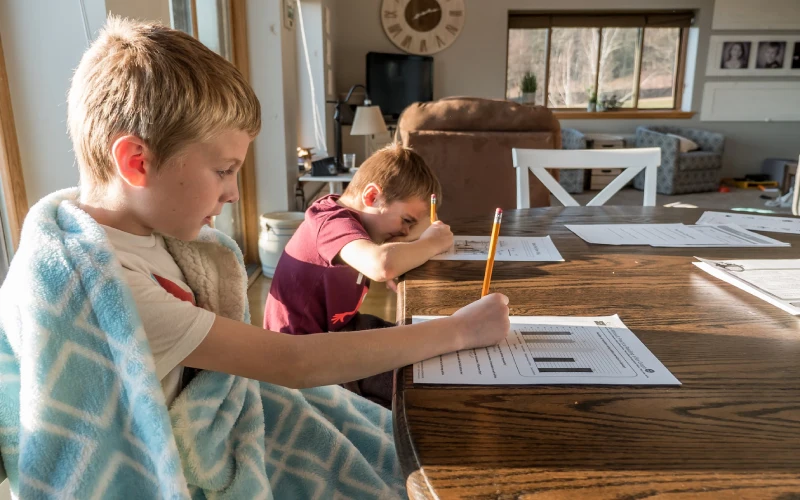
For students to survive online schooling, schools must keep in touch and work with their parents. As parents became surrogate teachers for their children, schools need to make sure that they’re updated on the latest academic activities and the modes wherein the students are allowed to do work.
While it does not mean that the parents will be replacing the teachers, they should be working as partners in empowering the students to learn more and better despite the change of instruction modality.
It is important for schools to maintain open and regular communication with parents, particularly during the pandemic when many students are learning online. This can help to ensure that students have the support and resources they need to succeed in their studies.
Here are some ways that schools can work with parents to support students during online schooling:
- Provide regular updates: Keep parents informed about their child’s progress and any changes to the school’s policies or procedures.
- Encourage parents to be involved: Invite parents to participate in online learning activities, such as joining class discussions or helping to supervise their child’s online learning.
- Share resources and tips: Provide parents with resources and tips to help them support their child’s online learning, such as guidelines for setting up a suitable learning space or strategies for managing screen time.
- Offer support: Make sure that parents know who to contact if they have questions or concerns about their child’s online learning.
By keeping in touch and working with parents, schools can help students to succeed in their studies and to thrive during the pandemic.
7. Tutorial Sessions
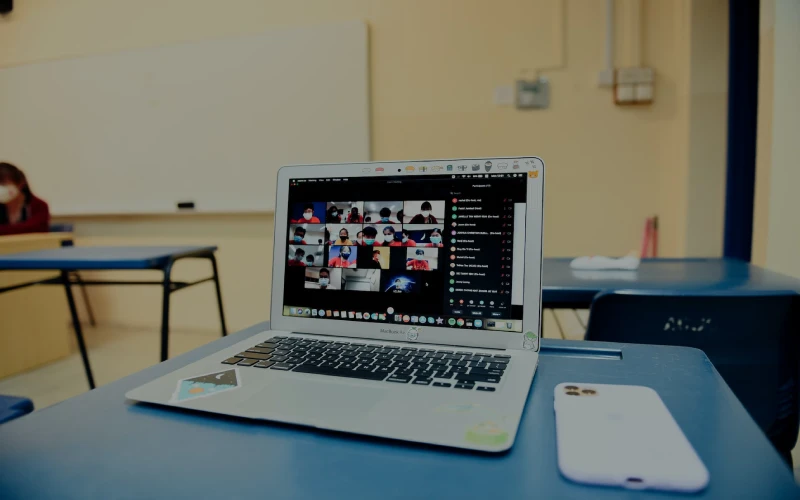
Teacher consultations are necessary for a student’s life, but students cannot personally check in with their teachers due to the pandemic. While they can do it online, the response usually depends on the teachers’ load and may not be in real-time. Schools have developed a system of tutorial sessions wherein there is a window of time for students can still get in touch with their teachers to ask them questions regarding classroom topics.
These tutorial sessions also enable teachers to focus on subjects that they’re most confident with, with other teachers handling other more comfortable subjects. These sessions help students to understand topics better and have a deeper appreciation for the things they’re learning in class.
Online tutorial sessions can be a valuable resource for students who are learning remotely. These sessions can provide students with personalized support and guidance as they work through course material and assignments, helping them to stay on track and to succeed in their studies.
There are many ways that online tutorial sessions can be structured, depending on the needs and goals of the students. Some common elements of online tutorial sessions may include:
- Virtual review of course material: Online tutorial sessions may involve reviewing and reinforcing key concepts and ideas from the course through online lectures, video tutorials, or interactive activities.
- Virtual practice and application: There are many online applications and tools that can help students achieve their goals. Online tutorial sessions may include opportunities for students to practice and apply what they have learned through online activities such as problem-solving, group work, or hands-on projects.
- Individualized support: Online tutorial sessions may provide students with one-on-one support and guidance from an instructor or tutor through online communication tools such as video conferencing or messaging.
- Review of assignments and assessments: Online tutorial sessions may involve reviewing and discussing assignments and assessments, helping students to understand what is expected of them and to identify areas for improvement.
Overall, online tutorial sessions can be a valuable resource for students who are learning remotely, providing them with personalized support and guidance as they work towards their academic goals.
8. Training to Plan and Organize

One of the best by-products of the online learning setup is that schools are helping students learn to plan and organize themselves. These vital skills have been largely overlooked and underappreciated until adulthood. They’re essential in achieving academic success, which can now be done by relying on the children’s abilities to determine and prioritize. Schools help their students by making sure that they plan and organize their academic activities.
Online learning can certainly help students to develop skills in planning and organization, as they are often required to manage their own time and workload to complete coursework and assignments. This can be especially important for students who are learning remotely, as they may not have the same level of structure and support as they would in a traditional classroom setting.
Here are some ways that online learning can help students to develop planning and organization skills:
- Time management: Online learning often requires students to manage their own time and to set and meet deadlines for completing coursework and assignments. This can help students to develop important skills in time management and to become more self-directed learners.
- Independent learning: Online learning often requires students to take more responsibility for their own learning and to work independently to complete coursework and assignments. This can help students to develop self-motivation and self-discipline.
- Resource management: Online learning may require students to access and manage a variety of resources, such as course materials, assignments, and feedback. This can help students to develop skills in organizing and prioritizing their work.
Overall, online learning can be a great way for students to develop important skills in planning and organization, which can be valuable in both their academic and personal lives.
Conclusion
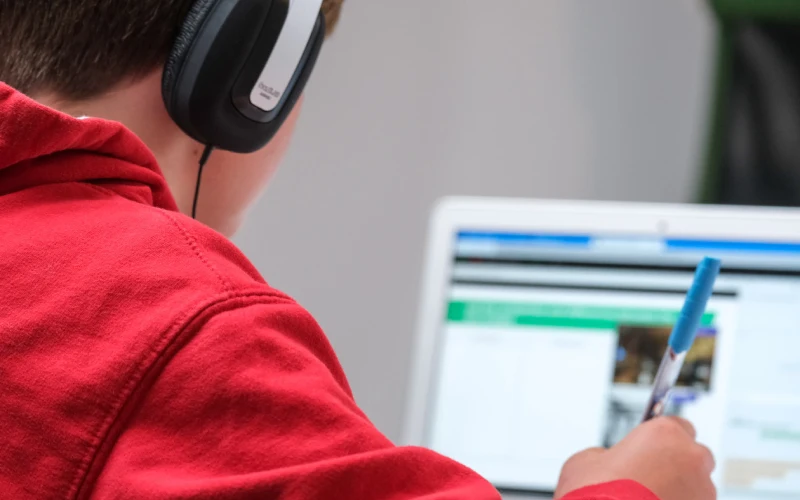
While schools are also adjusting to the times, they try their best to enable distant learners to fulfill their academic requirements, but with less stress and anxiety. As students go through online learning, their schools make sure that they get the best from the materials and systems they’re still trying to develop. The ways schools are helping online students achieve academic success may become part of the new normal, leading this generation of self-reliant and productive individuals to the future.





